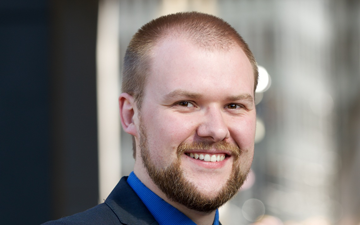CPA Student Blog: Should I take university or CPA prep courses?

Andrew Knapman on the pros and cons of two prep study routes
Canadian Accountant is pleased to introduce student blogger Andrew Knapman. The views expressed in this guest blog are his own. Follow him on his journey to becoming a Chartered Professional Accountant through future blog postings on Canadian Accountant.
Most people begin their CPA journey by studying for a degree in accounting; then, upon graduation, immediately registering for the CPA professional education program (PEP) while looking for work, often with one of the Big Four.
But what if you don’t choose your career path until after your degree?
I came to Canada in 2012 from the UK with a degree in business finance. I quickly found a job and was whisked under the wings of a CPA who encouraged me to follow in his footsteps. After sending CPA BC my transcript from university, I was pretty pissed to be told I needed to complete a ton of prerequisite courses before I’d be allowed to start PEP.
I had two choices: Work my way through the prep courses or study the same courses through an accredited university. I began with a mix of both before taking the remainder of my courses through CPA BC.
Which path should you take? Based on my experience, here are their pros and cons:
CPA Preparatory Courses
- Faster. The CPA preparatory courses are generally faster than taking the same courses through a university, taking on average six to eight weeks for each course. I found universities like to break one CPA course down into several courses, each taking six to eight weeks, thereby increasing your study time.
- Cheaper. As there tends to be fewer prep courses, the overall cost is cheaper. Also, your provincial CPA body gives you all the necessary material for study, so you don’t need to buy a single book.
- Better Notes. I found the CPA prep courses provided better, more succinct notes than those provided by universities, tailored to the CPA program. Now that I’m studying in CPA PEP, these notes have proven invaluable, and it’s saved me from enormous university textbooks, half of which are irrelevant dross.
- Intensity. One thing you’ll hear time and again is just how intense the CPA program is — and I won’t deny it’s all true. I found the prep courses did a good job of preparing me for the intensity of CPA PEP, particularly with time management. Universities generally go at a slower pace and might not prepare you as well as the CPA courses.
- Familiarity. The prep courses use all the same software as CPA PEP, specifically D2L & Securexam. They also use the same style cases and multi-choice questions as PEP. They love rules and regulations too and you get to experience those gems in their prep courses. (No wireless mice or pens allowed in exams!) Going through the prep courses prepares you for a seamless transition to PEP.
- Flexibility. You can study the prep courses in a number of ways, such as self-study, online webinars and in-class. I preferred a combination of self-study and webinars to going to class. Many universities don’t offer online classes, which limits choices for working and older students whose time is limited.
University Courses
- Employment. The big firms prefer to recruit through university. So if you’re set on joining the Big Four, your chances are severely diminished by taking the CPA prep path. I never cared to work for a firm, as I was already working privately, but it’s definitely something to consider.
- Intensity. I wanted to complete the prerequisites as fast as possible and was in a position to work long hours. But if you want to take things a little slower, going through university might be a better option. It will not prepare you for the intensity of CPA PEP and it will be more expensive but you may benefit from great breadth or depth in your studies.
- Timing. The main reason I chose to take one university course was simply timing. CPA prep has a rigid schedule and, if it doesn’t fit your schedule, you’ll have to wait three months to the next offering. Universities offer courses at different times, so you might be able to find a university course that is more suitable to your schedule.
Having completed every prerequisite module and transitioned smoothly into CPA PEP (and passing Core 1 and Core 2 with distinction), I’m more than happy to have taken the majority of my prerequisite courses through my provincial CPA body.
But which path you take is your own decision, based on your schedule, your budget, your long-term expectations and your own set of circumstances. There are many paths but all lead to the CPA designation. Good luck on your journey.
Andrew Knapman lives in Vancouver, B.C. and is a student in the CPA Professional Education Program through CPA BC. The views expressed in this guest blog are his own. Connect with Andrew through his LinkedIn profile and follow him on his journey to becoming a Chartered Professional Accountant through future blog postings on Canadian Accountant.







(0) Comments